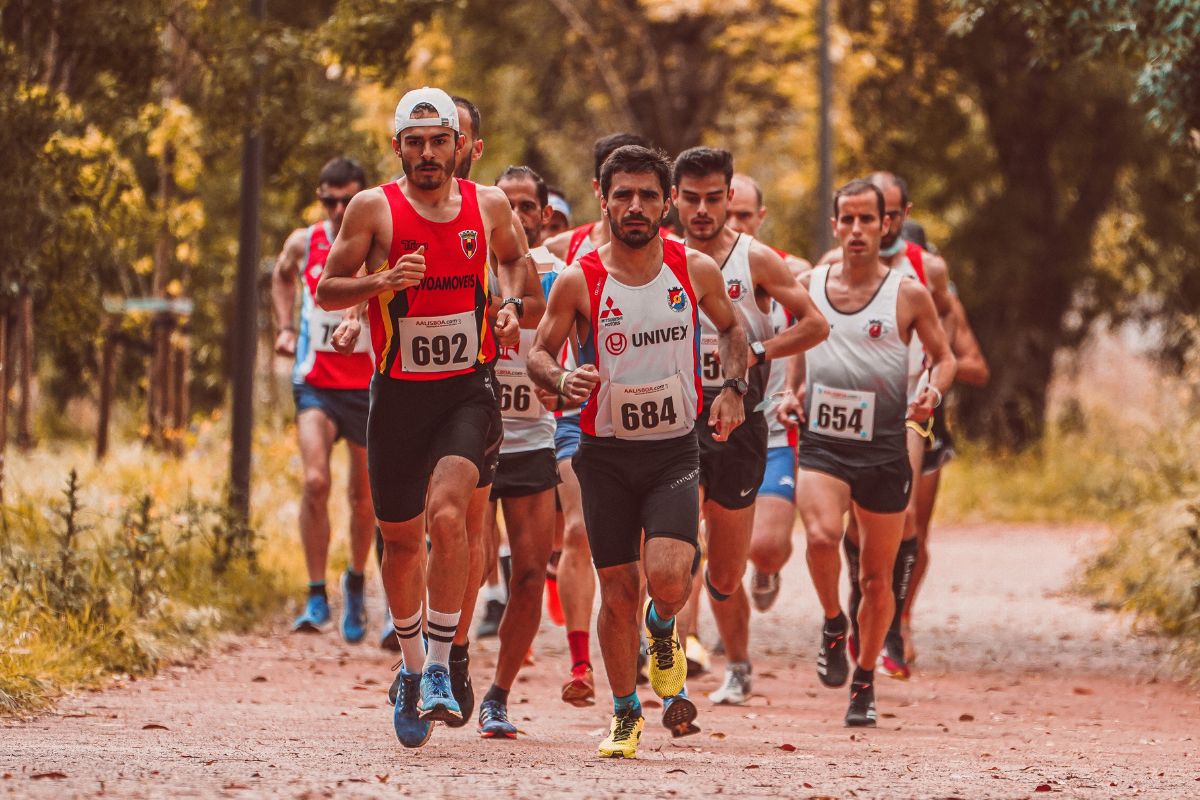Have you got big dreams of completing a marathon?
Whether you’ve yet to check a one mile run off your running checklist or you’re a seasoned runner who’s taken some time off – if you’re looking to get prepared for a marathon run, rest assured that you have clicked on the right article!

Regardless of whether you want to push yourself to achieve a new running distance, or you simply want to have some fun and spend some time challenging yourself to complete a long distance run, we are here to help you get prepared for the big race day while also ensuring that you are able to stay safe and enjoy yourself.
In this article, we are going to be talking you through a running training plan that will help you to become prepared for a marathon level run – regardless of your current level of fitness or running ability.
So, whenever you’re ready – just keep reading to get you on the right track to completing your very first marathon!
Is 8 Weeks Enough To Train For A Marathon?
Ultimately? The amount of time it will require to get prepared for a marathon run will greatly vary from person to person.
However, for the average person that already has some fitness ability, 8 weeks will most likely be enough time to get their mind and body prepared to take on the challenge of a marathon run.
Along with making sure that you are eating clean, taking care of yourself and making sure that your body is getting lots of regular rest inbetween exercise, a crucial part of the preparation process is going to be a training plan.
By making sure that you are following a plan, you will be able to provide yourself with a clear plan to make sure that your body is able to get into peak physical condition before the big day, while also making sure that you have plenty of time to rest, recover and mentally prepare yourself for the marathon, too.
This brings us to our next section!
Beginner Friendly 8 Week Half Marathon Training Plan
Regardless of your level of experience, an organized training plan will help you to get your body and mind where they need to be in order to handle the demands of a half marathon!
While there are many experienced runners that will curate their own training plan to help make sure that they are prepared for their long distance runs, it can be hard for a first timer to know what they should be targeting when getting ready to tackle the training required for a half marathon.
To help cut out the confusion and ensure that you are able to jump straight into training today, below, you will find a helpful 8 week half marathon training plan that we have expertly put together.
By following this plan that we are going to be sharing with you below, not only are you going to find that you are able to get your body ready to handle the requirements of a half marathon run, but you will also find that you are mentally prepared, too.
Whenever you’re ready, just keep reading to discover our 8 week half marathon training plan aimed specifically at first timer marathon runners, or runners who are coming out of a period of hiatus:
| Week | Monday | Tuesday | Wednesday | Thursday | Friday | Saturday | Sunday |
| 1 | Rest | 6 mile run | 6 mile easy run | 5 mile run with interval training | Cross training of your choice | 8 mile run with 4 20 second speed breakouts | 5 mile run |
| 2 | Rest | Cross training. 6 mile run with 5k pace | Cross training of your choice. 5 mile run with 20 second strides | 5 mile or more followed by strength training | Cross training of your choice. 5 mile run with 20 second strides | 5 mile or more followed by strength training | 5 mile run |
| 3 | Rest | Cross training of your choice. 5 mile run with 20 second strides | 5 mile run followed by cross training | 8 mile run with 4 20 second speed breakouts | 5 mile or more followed by strength training | 8 mile run with 4 20 second speed breakouts | 5 mile run |
| 4 | Rest | Cross training of your choice. 5 mile run with 20 second strides. | 5 mile run followed by cross training | 8 mile run with 4 20 second speed breakouts | 5 mile or more followed by strength training | 8 mile run with 4 20 second speed breakouts | 5 mile run |
| 5 | Rest | 8 mile easy run | 5 mile or more followed by strength training | 8 mile easy run | Cross training of your choice. 5 mile run with 20 second strides | 5 mile or more followed by strength training. | 5 mile run |
| 6 | Rest | 6 mile run with interval 6 20 second speed breakouts. | Cross training of your choice. 5 mile run with 20 second strides | 6 mile run with interval 6 20 second speed breakouts | 5 mile run followed by strength training | 8 mile easy run | 5 mile run |
| 7 | Rest | 10 mile run. Cross training optional. | 8 mile easy run | 8 mile easy run | Cross training of your choice. 5 mile run with 20 second strides. | 8 mile easy run | 5 mile run |
| 8 | Rest | 10 mile easy run | Cross training exercise of your choice. | 5 mile easy run with strength training of your choice | 10 mile easy run | Rest recommended | Rest recommended |
As a side note, keep in mind that this is just a general guideline for a beginner friendly training program.
Please feel free to modify this training program that we have provided above to align with your personal goals and preferences.
By making sure to follow the running schedule that we have provided you with above, you should find that you are able to cover the 21 miles required to complete your half marathon with ease.
Or, at the very least – without needing to take a break and stop halfway through!
First Timer Marathon Runner Tips For Success
Now that you have taken the time to read through the running training plan that we have shared with you above, we are now going to be taking the time to talk you through some running tips that are especially useful for first time marathon runners.

Just read on to discover some insider tricks that will help you unleash your full potential on your marathon day!
Focus on Recovery
Successfully completing a marathon run can often be more mentally challenging than physical – so it only makes sense that you should make sure that you are prepared for the run by making sure that you are taking good care of yourself in the run up to the big day.
By making sure that you are putting plenty of time and focus into your recovery, you will help to increase the effectiveness of your training, all while ensuring that your body and mind are aligned and optimally prepared for the run.
Below, let’s take a closer look at some of the best ways that you can help to maximize your recovery in between marathon training sessions and your schedule training plan that we have just talked you through above:
- Use a massage gun or foam roller after each training session: This is one of the best ways that you can help to aid your muscles in recovery while also helping to get rid of any lactic acid or toxins in your muscles after running. As you are training for a marathon, it only makes sense that your leg muscles are going to be the muscles that are going to be taking the brunt of your training sessions. So, after your training sessions and during your rest and recovery days, we recommend that you massage the muscles that are most targeted in order to help speed up your recovery in between each training session while also working to help relieve any pain that you might be feeling. One of the best ways that you can give yourself a massage is by using a massage gun, however, if you do not have a massage gun, then you can alternatively opt to use either a foam roller or your hands!
- Make sure that you are eating right: Along with making sure that you are getting plenty of rest and giving yourself self massages to help aid in the recovery process between training sessions – you should also make sure that you are eating clean in order to support your body during both the training as well as during your marathon. In order to make sure that your body is optimally prepared for the big day, we recommend that you try and eat as healthily as you can in the lead up to the day of your marathon. Of course, even though everyone’s body is different, it is generally recommended that runners preparing for a marathon (or similar long distance run) should make sure that they are fortifying their body with plenty of nutrients, protein and carbohydrates. There are also many different types of products on the market designed specifically for marathon runners, such as energy gel which is often full of protein and other ingredients that will give runners a surge of energy at challenging points of the marathon event.
- Get plenty of rest days: Along with all of the above, we also strongly recommend that you don’t shy away from taking rest and recovery days as you need them. Even though it is important to make sure that you are pushing yourself to raise your running endurance and general fitness ability in the run up to your marathon day, it is also just as important to make sure that your body is physically sound and in good health before the run, too. The last thing that you want to do is overwork yourself without making sure that your body is also getting the time that it needs to rest, recover and heal from the training program that you are going to be following above.
Make Sure That You Are Getting Plenty Of Sleep In The Weeks Leading Up To The Race
While this one should certainly go without saying, making sure that you are getting plenty of rest is going to be crucial to your success on the day of your marathon.
Just like with other types of physical exercise, it is absolutely essential that you are making sure to give yourself (and your body) plenty of time to rest so that you can recover from training.
If you do not make sure that you are giving yourself plenty of time to recover from your training sessions, not only will your body feel fatigued, but you are also likely going to struggle to find the endurance to push through and complete a long distance run.
So, with all of that being said, while also making sure to take rest days to allow your muscles to recover from training them, you should also be sure to try and get at least eight hours of sleep each night in the weeks running up to the marathon.
This will help to make sure that your body and mind are functioning optimally and prepared to take on both the mental and physical challenge of the race!
Pace Yourself Out Of The Gates!
Alongside making sure to get plenty of rest and recovery when preparing for the big marathon day, when the race day comes around, you should also make sure to pace yourself – especially at the beginning of the run!
The last thing that you’ll want to do is to push yourself too much too early and end up struggling to overcome the challenge to keep running.
Instead, we recommend that you start off slow when you begin running, and then slowly work your speed up as you go along.
Just like with all other forms of physical activity that involves cardiovascular endurance, you will need to overcome the initial switch that your body will make between its aerobic and anaerobic system which typically tends to take around 10 minutes to achieve.
During this time, you might find that your body feels uncomfortable or that you struggle to catch a breath, but once you move over to your anaerobic system, you will naturally begin to find it a lot easier to maintain your pace and even increase it at certain times.
Due to this, starting off slow will not only help to preserve your energy, but also help to make the transition from your aerobic to anaerobic system a lot easier for you, too.
In addition to this, making sure that you are preserving your energy will come in handy at various points throughout the race when you’ll need it most, such as while pushing your body to run up an incline, or even when needing to push through and make it to the next available hydration point.
Spend Plenty Of Time Warming Your Muscles Up Beforehand
Here’s another tip that can greatly help to increase your stamina and performance while running a marathon!
Making sure that you are warming up before you begin your marathon race will not only help to ensure that you are able to run for longer as your muscles will be prepared for the task at hand, but it will also help to reduce the chances of you experiencing any aches or pains while running.
Still, making sure that you warm up properly before embarking on your marathon race can often be a lot easier said than done – especially when you take into the account the various nerves and butterflies that you are likely to experience in anticipation of the race.
However, despite the pre-nerves, we strongly recommend that you take the time to fit in around 30 to 60 minutes of warm up preparation before you embark on your marathon, because if you don’t – you’re likely going to find yourself needing to stop and take breaks from cramping or other pains.
In order to make sure that you are warmed up and ready for your marathon run, we recommend that you spend around 10 to 20 minutes jogging the morning of the marathon, as well as taking plenty of time to stretch your muscles in order to ensure that they are supple and ready to be used.
Along with this, making sure that you are taking the time to stretch your muscles before embarking on your marathon running race will also help to ensure that toxins and lactic acid are released from your muscles, which will help to prevent any cramping or other running pains in the muscles.
Make Sure That You’re Prepared
Again, while this one should certainly go without saying, it’s very important to make sure that you are preparing for your marathon with plenty of training.
Unlike other types of running, a marathon style run comes with its own set of challenges, especially given the fact that it is one of the longest running distances that you can competitively run, regardless of whether you’re attempting a full or a half marathon.
With that being said, if you don’t make sure that you are putting in the time and effort to make sure that you are optimally prepared for the marathon you are planning to run, then you are more than likely going to find yourself unable to overcome the physical and mental challenges to see you through the finish line.
Luckily, by making sure that you are following the training plan that we have conveniently shared with you above, you should find that both your body and mind are optimally prepared for you to complete your marathon run – regardless of whether this is going to be the first marathon run attempt that you try, or you are returning to long distance running after a period of taking a break from it.
Along with making sure that you are following the training plan that we have provided you with above, if there is still quite some time left before your upcoming marathon – then we also recommend that you push yourself to work up your running endurance before even beginning your training plan.
For example, if you don’t have a lot of running experience (or at the very least, little experience covering a long distance) then we recommend that you push yourself to hit a new distance milestone during each run that you make.
For example, if you’re yet to hit a mile, work on achieving that and then push yourself to run another until you can comfortably cover a 10K run.
By having patience and being prepared to put in the time to get your endurance and fitness ability where they need to be, then you are going to have a whole lot easier time ticking a marathon run off your running checklist.
Don’t Ignore Pain Or Injuries
Last but certainly not least, the final first timer marathon running tip that we have to share with you is to not ignore any signs of pain or injuries.
Even though it can often be tempting to try and push through aches and pains, doing so can actually be counterproductive and lead you to developing a more serious injury that could prevent you from completing your race – or worse, even being able to enter it in the first place!
During the training, it is natural for you to experience mild to moderate discomfort as you are going to be pushing yourself to reach new levels of fitness and stamina.
However, if you find yourself stuck with an injury, or experiencing pain that does not feel right – then you should make sure that you are seeking the necessary treatment from a doctor or physiotherapist.
Even though this might seem tedious, dealing with pain and injuries as they arise will help to prevent them from getting worse and potentially impacting your ability to run.
Along with this, if you experience any extreme pain or discomfort while running your marathon, you should make sure that you stop running the race immediately so that you can seek the necessary medical treatment.
If you do not do this and keep trying to run the marathon in order to finish it, not only will you take the enjoyment out of the run, but it might also lead to you developing an injury that might prevent you from being able to run in future events.
Even though this is unlikely to happen on the day for you, if you do experience an injury or some kind of unexpected pain, it’s always better to be safe than sorry and retire from the run so that you can treat whatever the problem is.
Frequently Asked Questions
How Long Should A Beginner Train For A Marathon?
Whether you’re just getting started in the running community and you’d like to give your very first long distance run a go, or you’re coming back after an injury and want to accomplish a marathon run – it is widely considered that 8 weeks is enough time for the average runner to prepare themselves for a run, especially if they already happen to have a fitness foundation to go off.
During the 8 weeks buildup to a marathon, the majority of runners will follow a marathon training plan (just like the one that we have shared above) that is tailored to their current fitness ability and workout preference.
With that being said, if you are a runner that is looking for a training program that will be suitable for you, we think that you will find the training program that we have shared above very helpful in getting you ready to take on your very first marathon run.
However, while 8 weeks is typically deemed to be the standard amount of time required to prepare the average runner for a race, if you are a complete beginner or don’t yet have a lot of running endurance, then you are likely going to find that you need a little bit longer than 8 weeks to get your body ready to handle the demands of a 26 mile run.
How Do I Train For A Marathon With No Experience?
Do you want to complete your very first marathon run but have little to no experience in running long distances?
The good news is that, regardless of what your level of experience might currently be – even a first timer will be able to properly prepare themselves for a marathon run by making sure that they are properly trained and ready to handle the distance.
If you are a beginner runner or you’ve only just recently gotten yourself started in the running world, then there are a few different things that you are going to want to do if you are planning on completing a marathon.
First things first, you are going to need to make sure that you have enough time to prepare yourself (you are going to be the best person to decide how long your body will need to get to the level of fitness required to run a half or full marathon) as well as get yourself a training plan that you can follow in the run up to the big racing day.
If you are a beginner runner, we strongly recommend following the training plan that we have provided you with above.
Not only will it help to make sure that you are ready to take on the challenge of a marathon after just 8 weeks of training, but it will also help to make sure that you are able to make the very most out of your preparation time as a runner with little to no running experience.
Along with making sure that you have a great marathon training plan in place that you are going to be able to follow, you are also going to need to make sure that you are eating right, taking the time to care for your body and mind (which means taking plenty of rest days along with training) while also making sure that you have the right equipment to wear on the day to help maximize your performance and ensure comfortability.
In particular, if you are planning on attempting your first marathon run, we strongly recommend that you get yourself a high quality pair of running shoes instead of wearing just regular sneakers.
Unlike regular trainers, shoes that have been specifically designed for marathon runners will not only be able to provide your feet, ankles and legs with the support needed to run the allocated number of miles, but they will typically come complete with innovative features designed to help elevate your performance while maximizing comfortability.
How Long Is A Half Marathon?
If you are a beginner looking to tackle their first long distance run, then a half marathon is a good option to consider if you don’t quite feel ready to take on the challenge of a full marathon.
However, even though a half marathon is not as long as a full marathon, it’s still important to make sure that you are properly prepared for the race – as you will typically be required to run around 21 miles, which is sure to be a challenge for even the most experienced of runners.
If you’re planning to run your first half marathon and want to know the ins and outs of what you can expect on the day, you can typically expect a half marathon run to take anywhere from one to five hours, depending on a variety of different factors such as your sex, physique and your general fitness level at the time of running the half marathon.
However, for the average person attempting to run their very first half marathon, the total running time will usually be anywhere from 2 to 3 hours with proper training and preparation having taken place.
Nevertheless, if you are planning to run your very first half marathon, it is important to remember that while setting yourself healthy challenges are good, it’s okay if you don’t achieve the time that you are initially aiming for.
Many runners often find themselves having to compete in a few different marathons (both full and half) before their bodies are able to start handling the demands of a long distance run.
The Bottom Line
There we have it! Now that you have taken the time to read through our beginner friendly running guide, we are hoping that you are now feeling ready to begin preparing for your marathon!
By making sure that you stick to the training plan that we have shared with you above, you should find that your fitness ability and endurance are in peak condition by the time that your marathon day rolls around.
Along with that, by making sure to follow our tips and tricks that we have also provided you with above, you should also find that you are able to unlock your potential and boost your performance on race day – regardless of whether you’re going to be attempting your first marathon run or you’re getting back in the saddle after a hiatus from running.
Before you click off this page, why don’t you give this page a bookmark?
That way, if you ever need to come back and refresh your memory on the training plan that we have provided above (as well as to refresh yourself on our tips and tricks for acing the run) you will know exactly where to find us.
Thank you for taking the time to read through our training guide – and happy marathon running!
- Can Dogs Run Faster Than Humans? (Running With Your Furry Friend) - October 4, 2022
- 10 Doggie Fun Runs You Will Love [Ultimate Guide] - October 4, 2022
- What Are Division Results In Running? - October 4, 2022








